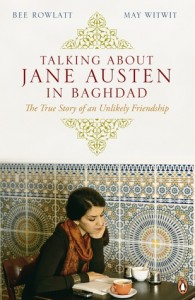 I’d seen this book before and was curious, so when Elin had it as part of a Bookcrossing bookray I grabbed the chance and snuck in ahead of the last person on the list (sorry!). I then somehow left it in the tbr pile for a few months (double-sorry!). But it’s moving on now, really!
I’d seen this book before and was curious, so when Elin had it as part of a Bookcrossing bookray I grabbed the chance and snuck in ahead of the last person on the list (sorry!). I then somehow left it in the tbr pile for a few months (double-sorry!). But it’s moving on now, really!
Bee Rowlatt is a producer for the BBC World Service and comes into contact with May Witwit while searching for English-speaking Iraquis to interview in the run-up to elections. While their e-mail correspondence starts out with a purely practical purpose, the two women soon start «chatting», about work and about life and a friendship develops. As life in Baghdad is hardly a bed of roses, they soon start discussing possible ways for May and her husband to get out of the country, and eventually hatch a plan to get them to Britain.
So far so good. Now, I have a few gripes.
Firstly, the spiel on the outside of the book goes on and on about how unlikely the friendship is and how «they should have nothing in common». Really? Two intelligent women with «intellectual» careers should obviously have nothing to talk about. Turns out they do.
My second gripe is more serious, I suppose, and that is that the book is around twice the length the «plot» and language can support. Let me elaborate. The «plot»: Not much happens. Bee talks about her kids, her globe-trotting husband and trying to balance career and family. May tells her about her life and about the everyday struggles of living in Baghdad (serious enough, don’t get me wrong, but even life in a war zone gets pretty mundane and boring in the long run). The title promises literary discussions, and, frankly, the bits where May relates how her students react to the books she teaches are the most interesting parts of the books, but they make up perhaps four pages of text all together – out of four hundred. And while both women write clearly and intelligently (for the most part), this is a real e-mail conversation, so, let’s face it, we’re not talking Nobel laureate quality of language and imagery here. The form does not make up for lack of action.
In other words, I lost interest about half way through. I vaguely wondered whether May would make it out, but I would have simply skipped ahead to the last page to find out if it wasn’t for the fact of this being a Bookcrossing book and I was loath to give up on it after having kept it so long.
Incidentally, my father happens to be reading Reading Lolita in Tehran at the moment. He saw my picture of Talking About Jane Austen in Baghdad on Instagram and commented that it seemed to be a case of one title being a rip-off of the other. I don’t know which title came first, but I do know that if you were to ask me which one to read I would go with Nafisi’s book every time.
One thought to “Talking About Jane Austen in Baghdad – Bee Rowlatt and May Witwit”